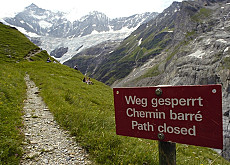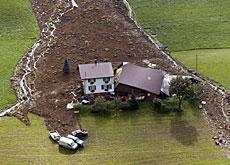Alpine resorts could feel the summer heat

Climate change will not just bring about changes in winter alpine tourism – it is likely to affect mountain resorts in summer as well.
Higher temperatures could mean more natural disasters and changes to the landscape, but could also bring in more tourists as well, say experts. But how will Swiss resorts react?
Although it is widely thought that some low-lying alpine resorts may go out of business as the snowline rises in winter, the consequences of global warming for mountain areas in summer may not be so drastic.
“Climate change presents many chances for Swiss mountain resorts,” Thomas Bieger, a tourism expert at St Gallen University, told swissinfo.
“With the increasing temperatures people might be more interested in going to the slightly colder areas located in the mountains,” he added.
Bieger says the drier climate may be an advantage as well. Scientists say Swiss summer temperatures could rise by three degrees Celsius by 2050 compared with 1990, with rainfall down by 20 per cent.
However, recent reports have also pointed to a downside. The glaciers, a principle attraction of the alpine areas, are already disappearing.
Natural disasters
This leads to changes to the landscape, and, as a consequence, more natural disasters such as floods and landslides.
A recent Bern University report, commissioned by resorts in the Bernese Alps, warned that local authorities must be more pro-active in dealing with these hazards.
Crisis management and risk analysis will take on a greater significance in the future to ensure the safety of tourists and keep travel links open. Public relations during crisis times must be stepped up, the study found.
Added to this, a government panel report released in March warned that a rise in popularity of alpine resorts during the summer months would not offset the expected loss in winter.
“To maintain their attractiveness, tourist destinations must adapt their offers to new conditions,” said the report. “The possible changes of climate and landscape should already be taken into consideration during the planning stages.”
Reactions
Many Swiss alpine cantons say they are aware of the challenges ahead.
“That’s certainly the hardest thing if we suddenly have more natural disasters, because areas that were frozen will melt and we will have to take measures in these areas,” Hansjörg Trachsel, canton Graubünden’s minister in charge of tourism, told swissinfo.
“But we are very well prepared, we know exactly where the dangers are and we don’t build in these places any more or we only construct reinforced buildings,” he added. “This certainly helps us, but it’s a danger we have to watch.”
For Trachsel, a warmer climate would be an advantage. He said the eastern canton of Graubünden – famous for its resorts of St Moritz and Davos – had already noticed an influx of people from the Italian city of Milan to the Engadine holiday region when the heat and smog become too much for them.
Uncertainties
It is a similar story in canton Valais, in the French-speaking part of Switzerland. Cantonal tourism minister Jean-Michel Cina says the area will not, however, be implementing rash measures.
“We have to be aware of climate change but not in the next years – the biggest issue for us will not be summer but winter, as we do not have enough water for artificial snow,” Cina told swissinfo.
Bieger says climate change has already brought more willingness to develop products for the summer, such as spa treatments alongside hiking. Companies have also been consolidating to make extra investments, such as for safety.
But he says it is still not possible to predict the exact effects of climate change.
“It could be that all of a sudden an unforeseen climate change effect appears – it could even become colder in central Europe,” said Bieger.
“So it’s not wise to prepare yourself for a certain scenario today when you don’t know what the development will be 30 to 40 years from now.”
swissinfo, Isobel Leybold-Johnson
Tourism was one of the subjects of March’s Advisory Body on Climate Change (OcCC) report on the effects of rising temperatures on Switzerland by 2050.
It said lakesides and alpine destinations could become more attractive when summers become hotter, but the lack of snow could spell the end of low-lying ski areas.
It also predicted that access to alpine resorts could become more difficult due to extreme weather.
The lack of snow and melting glaciers would have an impact on resorts’ attractiveness. The thawing of permafrost would affect ski stations and lifts that are anchored in the mountainside and there could be more landslides and rock falls.

In compliance with the JTI standards
More: SWI swissinfo.ch certified by the Journalism Trust Initiative



You can find an overview of ongoing debates with our journalists here. Please join us!
If you want to start a conversation about a topic raised in this article or want to report factual errors, email us at english@swissinfo.ch.